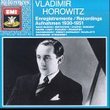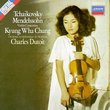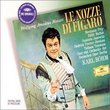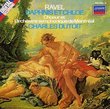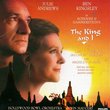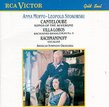| All Artists: Richard [1] Strauss, Giuseppe Sinopoli, Dresden Staatskapelle, Albert Dohmen, Alfred Reiter, Deborah Voigt, Jochen Kupfer, Johan Botha, Jurgen Commichau, Matthias Henneberg, Sami Luttinen Title: Richard Strauss: Friedenstag Members Wishing: 1 Total Copies: 0 Label: Deutsche Grammophon Release Date: 5/14/2002 Genre: Classical Style: Opera & Classical Vocal Number of Discs: 1 SwapaCD Credits: 1 UPC: 028946349427 |
Search - Richard [1] Strauss, Giuseppe Sinopoli, Dresden Staatskapelle :: Richard Strauss: Friedenstag
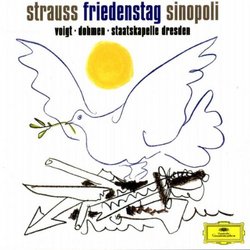 | Richard [1] Strauss, Giuseppe Sinopoli, Dresden Staatskapelle Richard Strauss: Friedenstag Genre: Classical
|
Larger Image |
CD DetailsSimilarly Requested CDs
|
CD ReviewsPacifist Strauss still packs a punch Ralph Moore | Bishop's Stortford, UK | 03/31/2010 (4 out of 5 stars) "I think this opera is worth acquiring and not just if you are a Strauss completist. As a big Strauss fan, I drew the line at the interminable "Guntram", and indeed that is the only Strauss opera which is probably performed less often than this one, which still awaits a UK premiere, I believe. It requires a big orchestra and two sterling singers and is awkward to pair with anything else. Additionally, its subject matter is rather arcane and possibly simplistic or sentimental to a modern audience; the irony is that it was frequently performed during the 30's while the Nazis were in the ascendant and no-one in authority seemed to find its message of peace, love and harmony incongruous with Nazi Germany's aggressive rearmament and expansionism. The action is set in the Thirty Years' War, the bloodiest period of internecine strife in German history, but the contemporary relevance must surely have been overt.
The libretto gave Strauss the devil's own job; it is a fairly high-flown collaboration between Stefan Zweig, (who, being Jewish, had to beat a hasty retreat but still kept an eye on things) and his librettist successor Josef Gregor. Both were sincere but had less of an ear for drama and dialogue than the composer himself; meanwhile he was typically too deferential to men of letters, just as he had been with Hofmannsthal. I have read some pretty damning things about both the opera and this recording, but have to say that they give me pleasure and neither the opera itself nor Sinopoli's performance is anywhere near as bad as some maintain, despite some mild longueurs, especially at the beginning. First, the Staatskapelle is superb; from 1992 until his death, Sinopoli turned them into a truly world-class orchestra where they remain today, and you can hear that. Secondly, despite reviews to the contrary, the singing is equally impressive: Albert Dohmen at times sounds very much like George London and brings the heft and authority of a seasoned Wotan to the role of the Commander. He is certainly preferable to Weikl's bleaty sound in the rival Sawallisch recording. Deborah Voigt is phenomenal: touching and feminine in her vulnerablity yet whacking out some terrific top C's in the final, rousing paean to Peace. I do not hear any unsteadiness, discoloration or steeliness in her tone, just hear one great dramatic soprano giving it all she's got and employing a trenchant lower register as required. Just as Dohmen is superior to Weikl, she is far preferable to Sabine Haas. Perhaps neither has the majesty of Hotter and Ursuleac but they do not have the advantage of high-tech sound, having been recorded in 1939. Supporting parts are well taken, especially Botha's caricatured Italian tenor, recalling a more celebrated role in "Der Rosenkavalier". The music is not consistently first-rate - some of what Pauline Strauss called "note-spinning" obtrudes - and there are plenty of echoes of other Strauss operas, not least how the opening, with guards on watch, reminds us of the start of "Salome" and how the blazing C major finale of "Friedenstag" recalls that of "Die Frau ohne Schatten" - but those last pages really make the most glorious noise when performed con gusto by Sinopoli and his willing forces. I thoroughly enjoy the work and even confess to finding many ideas moving - such as the entwining of the personal sorrow of the Commander's wife with her spirited appeal for reconciliation, or the elation of that last chorale. There is also a recording of a good live performance featuring the splendid Alessandra Marc, but on balance this recording seems the best choice, in that we have music here to which Sinopoli was especially temperamentally suited." |

 Track Listings (20) - Disc #1
Track Listings (20) - Disc #1